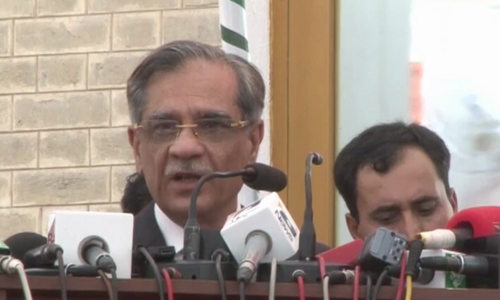While highlighting the need for judicial system reform, Chief Justice (CJP) Mian Saqib Nisar on Saturday also urged the chief justices of of the five high courts to ensure that they abide strictly by the law when passing a decision.
Talking to the media in Karachi, he said that since the judges do not have the power to pass legislation, they should focus on passing fair verdicts to ensure that justice is served within the limits prescribed by the law.
Acknowledging criticism that the progress of cases in Pakistan's judicial system is extremely slow, the CJP also stressed the need for courts to hold speedy trials instead of adjourning cases indefinitely.
Justice Nisar regretted that the public felt that courts take to long resolve a case.
One way to deter people from "dragging other people in courts", he said, is to impose heavy costs if they are proven wrong in a court of law. This discourages people from extending a lawsuit that has little legal merit ie, frivolous litigation.
He said that it was an unhealthy practice that people did not fear being taken to court because they are sure that it will take years for a case to resolve and even once a court passes a verdict, the party takes advantage of the options of filing appeals in higher courts.
He particularly regretted that innocent people are sentenced to jail for long periods because of delays in the criminal litigation system, due to which the appellants have to wait for months or years in order to prove their innocence just because their appeals remain in pending for so long before being heard.
"When people fail to get justice, they blame the judiciary," the CJP said.
"We have to ensure that justice is not delayed," he said.
Commending improvements in Punjab's judicial system, which has introduced information technology to aid the legal system and keep track of cases that are registered in courts to ensure that all cases are dealt with as quickly as possible, he said perhaps the other provinces need to take note of how to improve the lives of the people.
He also addressed the matter of judges being overburdened, saying that judges are unable to spend time on one case which forces them to adjourn hearings without any notable development.
Justice Nisar called for reforms in the legal system, saying that the laws that were created centuries ago by the British rulers of the subcontinent cannot be applied anymore. He urged lawmakers to consider bringing reforms in the legal system. However, he stressed that, despite shortcomings in the legal system, judges must not "encroach upon" lawmakers' jurisdiction and pass verdicts that are in accordance with the law.
The CJP also criticised the practice of undocumented or oral evidence, due to which several cases stretch for years. He insisted that first information reports should be filed after a thorough forensic examination of the crime scene instead of being lodged by an officer who has never visited the crime scene.















































